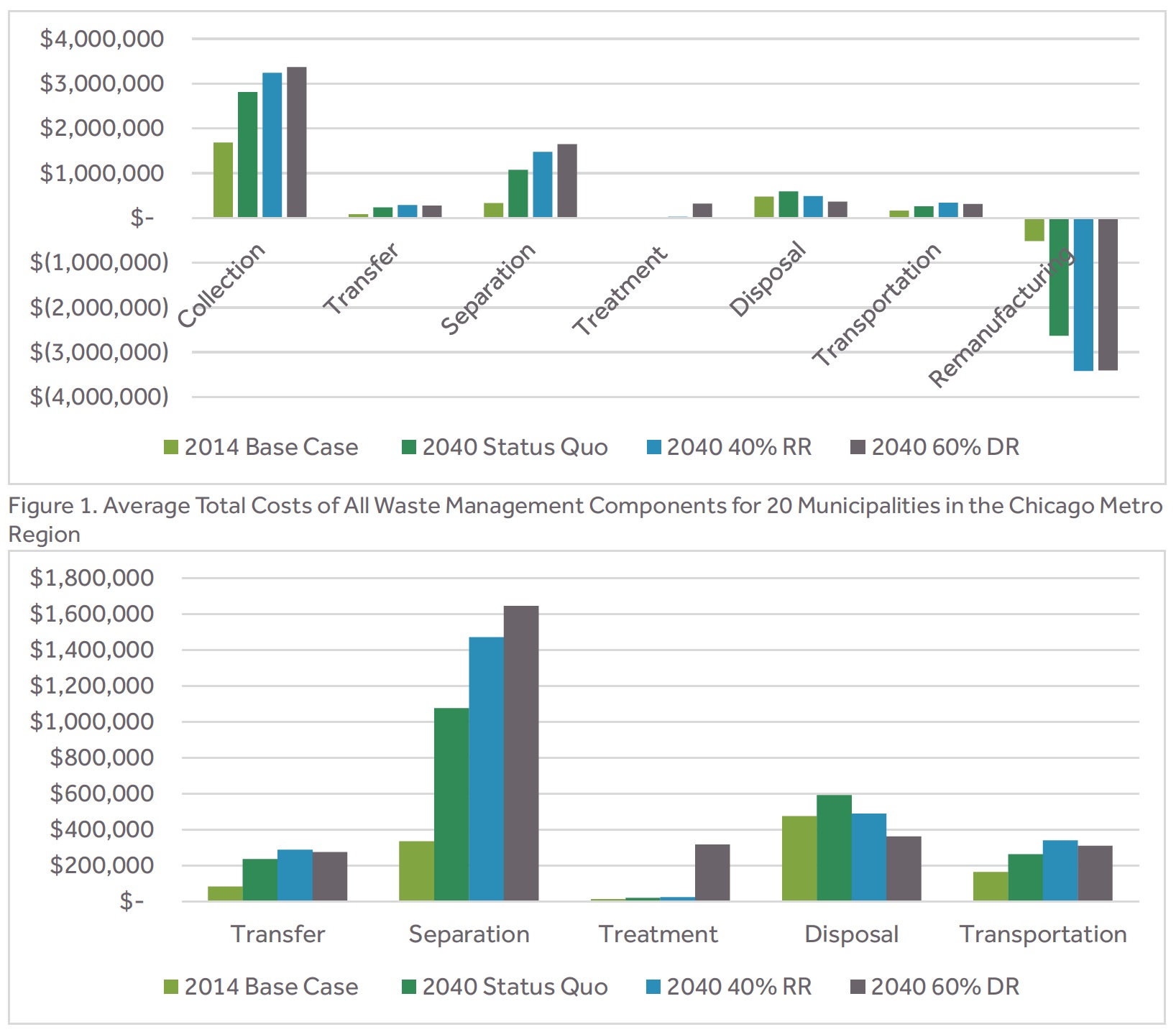DELTA INSTITUTE
Introduction
Waste management in the
U.S. is a $43 billion industry,
employing 202,937 Americans.
While largely hidden from public
view, our waste management
system is a major economic
driver with the potential
to advance environmental
sustainability objectives, such
as waste reduction, resource
conservation, and material reuse.
The Chicago Metropolitan Region’s waste
management statistics lag behind national averages.
Currently, Cook County residents produce 7 pounds
of waste per day compared to the average American
who generates 4.4 pounds of waste per day, and
Cook County’s 29% (excluding Chicago) recycling
rate trails the national average of 34%. Concerned by
Cook County’s above-average waste generation and
below-average recycling rate, Delta Institute sought to
determine the existing conditions of the region’s waste
management system and its associated environmental
and economic impacts.
With support from Searle Funds at The Chicago
Community Trust, Delta Institute conducted a regional
waste benchmarking study. Using data supplied
by Cook County and participating Chicagoland
municipalities, we determined the economic and
environmental costs of current waste management
practices for 20 municipalities across the Chicago
Metropolitan Region. The research team then modeled
the economic and environmental costs in the year
20402
under three distinct future waste management
scenarios. The three waste management scenarios
include: 1) Status Quo in 2040, 2) 40% Recycling Rate in
2040, and 3) 60% Waste Diversion Rate, where waste
diversion includes recycling and compost, in 2040.
We found that by increasing rates of recycling and
waste diversion, the Chicago Metropolitan Region
could create up to 39,000 regional jobs by 2040
and achieve significant environmental benefits,
offsetting all greenhouses gas emissions from waste
management-related practices, such as collection,
disposal, transportation, and separation.
Summary of Findings
Access to curbside recycling varies
in and among communities.
Inconvenient recycling options result in lower recycling rates. Of the 20 communities benchmarked, recycling options varied, including one community that provided a drop-off option instead of curbside recycling.
Consumer education is needed to
reduce contamination and improve
recycling rates.
Both communities with strong recycling programs and those with less robust programs cited consumer education as key to reducing contamination and improving recycling rates.
Local government leadership on waste management is critical.
Communities with successful recycling programs either have sustainability plans or have adopted the goals of a joint action agency for waste management.
Collection is the most expensive cost component of waste management.
The cost of collection is projected to increase, as population growth will result in additional material generation.
Waste diversion can more than offset all waste management-related emissions.
By attaining or exceeding a recycling rate of 40%, we can more than offset waste-related emissions, because the remanufacturing of recycled materials displaces the energy-intensive process of extracting raw materials.
We can create 39,000 regional waste-related jobs by 2040.
If the regional waste diversion rate reaches 60% by the year 2040, more than 39,000 regional jobs could be generated through expanded recycling, composting, processing, and collection.
About the Delta Institute
www.delta-institute.org
Established in 1998, Delta Institute is a Chicago-based nonprofit organization that works throughout the Great Lakes region to build a resilient environment and economy through sustainable, market-driven solutions. Over the last 16 years, Delta Institute has built a diverse portfolio of waste management work, including waste reduction, diversion strategies, landfill capacity analysis, and modeling of the environmental, economic, and social impacts of waste management strategies. Delta has led several successful waste infrastructure projects in recent years, including work with Cook County Department of Environmental Control on their waste audit and policies, assisting McHenry County to update their solid waste plan, developing tools and best practices around management of electronic waste, and founding and managing Chicago’s Rebuilding Exchange.
Tags: Chicago, Chicagoland, Cook County, Delta Institute, IL, Illinois, recycling







 RSS Feed
RSS Feed